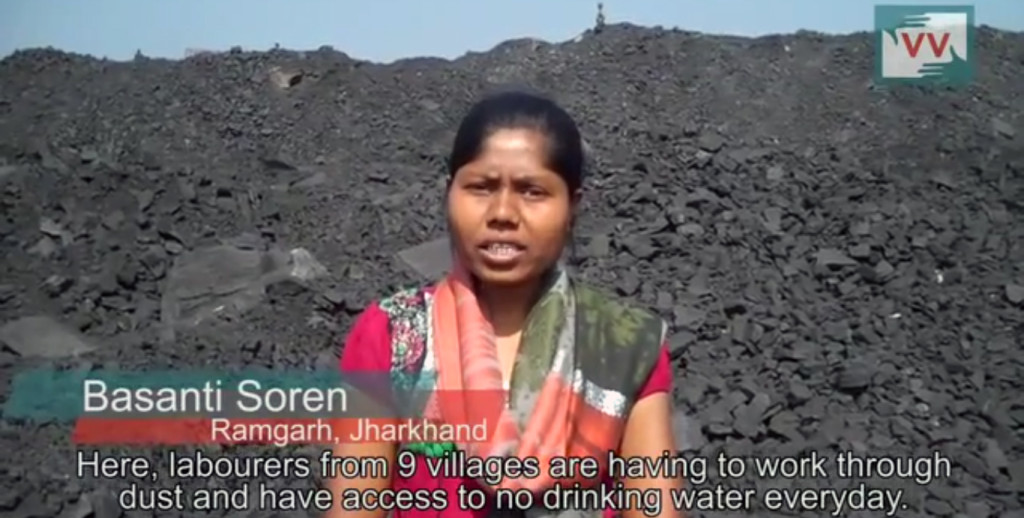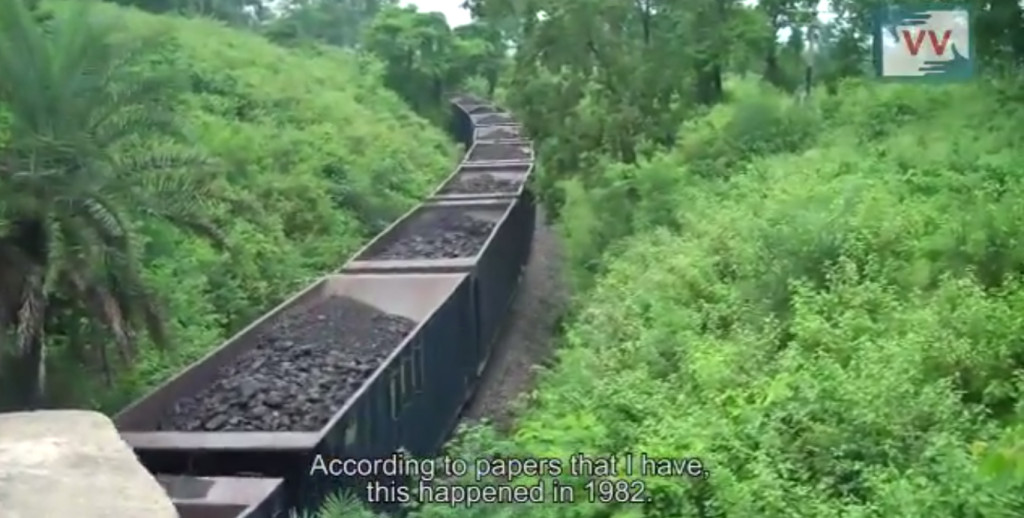In Jharkhand, some 228 families have spent the last three years clinging to their land, defying the Indian government, the World Bank and an international coal conglomerate. But the government’s decision to do away with mandatory consent in the Land Acquisition Act may spell the end of their struggle.
Really, they have been the smart ones. The more than 1,000 families that have already been displaced by the Parej Project, one of 24 backed by the World Bank in India, have yet to see any kind of compensation, despite the fact that the Bank made rehabilitation of the displaced one of the conditions for its funding.
‘When the company came, it promised to give electricity, water, education and medical aid. We didn’t get any of this”, one resident toldVideo Volunteers’ BasantiSoren, who joined fellow villagers at a recent rally organised against Central Coalfields Limited, which operates the mines.

These are the voices that Soren documents; the ones the government and the mining executives don’t want you to hear. After all, what difference does the plight of 228 families make in the face of economic advancement? Well, to us at Video Volunteers, it makes all the difference. We give local activists like Soren - a fearless young woman living less than a kilometer from the project, who has felt the effects of the project almost her whole life -- a camera and a voice. And here’s why you should listen:
Soren’s isn’t the only story we’ve heard in recent years about land rights abuses. In fact, we’ve documented hundreds of cases offorcible evictions. Which is why it is so worrying to us that the new ordinancestrips the requirement of obtaining consent from affected peoples for certain projects. Depriving communities the right to veto a project is in violation of international norms to which India is signatory. It’s also in violation of Indian laws like PESA and FRA. Before, in order to acquire land the government needed approval from 70% of the community, which gave these districts a viable way to ensure their voices were heard and their welfare taken into account. We have heard a tremendous outpouring of fear from local constituencies over these new rules—and rightfully so.
The new changes take away the requirement of conducting a Social Impact Assessment (SIA) for five types of projects: industrial corridors, public private partnership projects, rural infrastructure, affordable housing and defense. So in any of these cases, the state will be able to claim land without tribal or local consent. Does this mean the state is no longer concerned with the adverse social impacts a project may have? Does it mean that they no longer feel responsible to minimize them? We fear it does.
Monetary compensation is now the only issue considered for acquiring land. Yet according to the government’s own reports—including, according to reports, the yet unreleased Report of the High Level Committee on Socio-Economic, Health and Educational Status of Tribal Communities—disregard for constitutional safeguards and guarantees is the reason so many land and forest-dependent communities are so poor.
Of course, the business sector has welcomed the amendments. So has the mainstream media, which apparently has no interest in the ordinance’s effects on the ground. No one wants to hear Soren’s side of the story: the hard truth that there are victims of crony capitalism and opaque acquisition procedures.
Proponents argue that without this grease the cogs of development might rust. But development is not a mill, with the Sorens of India crushed like grain into flour, easily blown away by the winds. What does it say about our society if we let industry steamroll rural cultures that are vital parts of India? Is progress piling every Soren in India into the slums of Delhi or Mumbai?
The government says the country has lost INR two lakh crore worth of investment because of the 2013 Land Acquisition and Rehabilitation Act. Of course they don’t give any sources, scientific studies or spreadsheets to back up these figures. And how is this even possible, given the LARR has only been in effect for a year? What about the costs to Soren’s community? All she and her people are asking for is the right to decide for themselves how their land is used and, if they agree to part with it, adequate compensation.

Perhaps a better move for the government would be insisting on prompt and full rehabilitation for the already displaced. Such a demonstration would go a lot farther in assuaging Sorens’ village.It would reduce the feeling that their concerns are so meaningless to the government as to be dismissed with the wave of a pen.
In press reports and TV appearances the Finance Minister strategically cites ‘defense’ and ‘national security’ while making the case for the changes. After all, what’s more important than economic development, but protecting India? What does Soren’s life matter in the face of a terrorist attack? What do the lives of those 228 families matter when there is the Mumbai Taj to defend? Such equations weigh the Sorens of India with the false equivalency of deshkhatre me hai(country is in danger) bogey. Communities are far more often destroyed in India when their only asset – their land – is taken away from them, not by terrorists.
Another troubling fact with the Ordinance is that it shows how much the ruling party is in bed with the RSS in policy formulation. A day after the ordinance was announced the RSS Joint Secretary Mr Krisha Gopal rued that Dr BR Ambedkar’s economic theories are unfortunately not given due importance. He cited Dr.Ambedkar’s paper on ‘Small Holdings in India and their Remedies’ and reminded us of Dr.Ambedkar’s pro industrialization stand. This move to woo the Dalit and Ambederkite intellectuals towards the ordinance is not just desperate (since he gives no context to Dr.Ambedkar’s thesis,) but it also reeks of double speak. ArunShourie, a BJP ideologue, almost two decades ago, wrote a big fat book to prove that Dr.Ambedkar is not the intellectual genius we make him out to be, and drove home the point by naming his book “Worshiping False Gods”! The timing of the Joint Secretary’s discovery of Ambedkar’s economic thesis smells of an attempt to ward off possible opposition to the ordinance by Dalits and Tribals who, after all, will suffer the most because of the amendments.
And finally, why isn’t the Parliament outraged by this move? The ordinance circumvents their constitutional democratic powers. Are they really so okay with such an enormous transfer of power to the Executive? Shouldn’t they be asking themselves if such a move would even pass Parliament if put of for a vote? Ordinances are generally meant for emergency situations. Where’s the emergency?
Given that the government has made no concrete plans to reduce displacement and destitution of the farming and forest dependent communities; given that there is no recognition of the fact that more than 40% of 6.5crore (65 million) Indians displaced since independence are tribals; given that people living in mineral rich states like Jharkhand and Odisha have not got any benefit of the so-called industrialization with more than a third of these two states living below poverty line; given that this ordinance snatches away constitutional safeguards of vulnerable communities, one is left with no choice but to believe that this ordinance has been pushed to appease businesses only.
Policies, particularly like this one on land that have far reaching impact on millions, must adopt a ‘people first’ position. Otherwise we know that abki baar mili company sarkar (this time we’ve gotten a company for our government.) Certainly, that’s the way it already looks from Soren’s perspective.
Stalin K. 14th Jan 2015
About the author:
 Stalin K. is a documentary filmmaker, media trainer and human rights activist from Gujarat, India. Stalin has directed 15 documentaries and has won several international awards for his films. He has produced six community radio programs, designed more than 20 rights-based campaigns and conducted over 300 trainings in film making and participatory video, street theatre, radio production, and development communications. He is the Managing Trustee of Video Volunteers.
Stalin K. is a documentary filmmaker, media trainer and human rights activist from Gujarat, India. Stalin has directed 15 documentaries and has won several international awards for his films. He has produced six community radio programs, designed more than 20 rights-based campaigns and conducted over 300 trainings in film making and participatory video, street theatre, radio production, and development communications. He is the Managing Trustee of Video Volunteers.
Also Watch:
Save Niyamgiri: Voices from Groung Zero
Beyond Coalgate:Mining Blackens River and Life in Jharkhand
Fighting Forced Evictions: 75 Families Achieve Victory in Maharashtra
Slum Demolitions in Mulund Cause Uproar
Solving Land Rights Issues
16 families from Odisha's Sundergarh district were paying taxes for a piece of land allotted to them 22 years ago through government schemes. But in reality the land was allotted only on paper. They did not even know the location of the land for which they had been paying taxes...
The happiness that comes with an yearly bonus
This video is a story of success, a story of a small win against a giant corporation. A story of persistence and a never-say-die attitude. This year, the workers of 3 gardens in the Alipurduar area of Kumargram Block, received a slightly increased yearly bonus, an increase of 3%, from...
